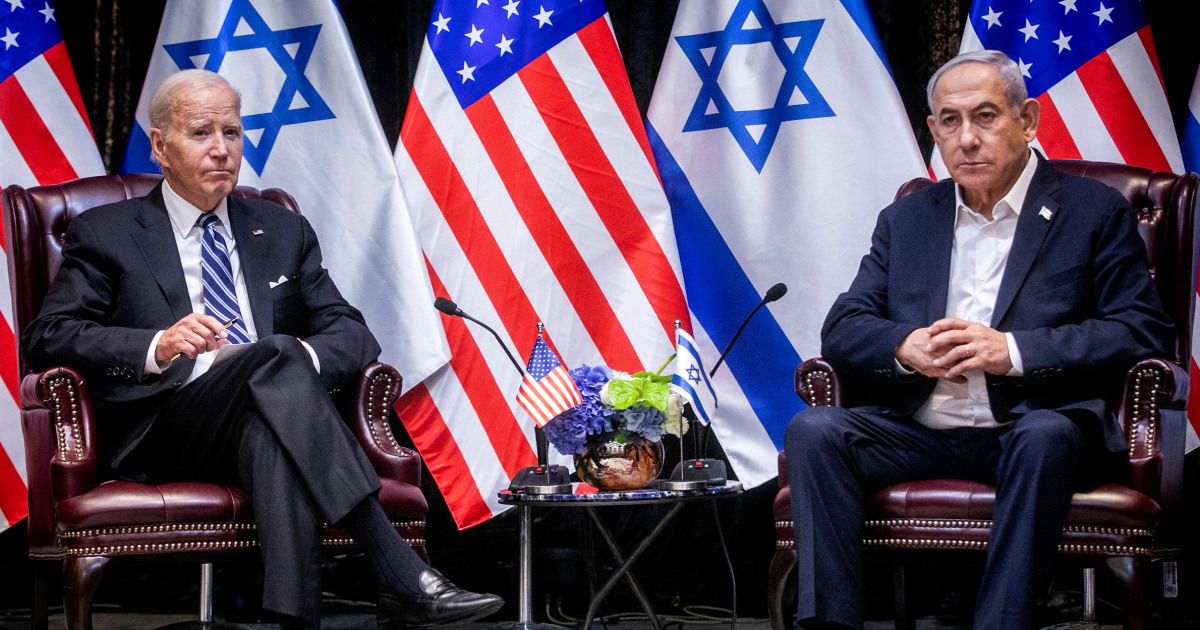
WASHINGTON — The Biden administration is discussing using weaponry sales to Israel as leverage to convince the government of Prime Minister Benjamin Netanyahu to heed long-standing U.S. calls to scale back its military assault in the Gaza Strip, according to three current U.S. officials and one former U.S. official.
At the direction of the White House, the Pentagon has been reviewing what weaponry Israel has requested that could be used as leverage, said the sources. They said no decisions have been made.
The sources said Israeli officials continue to ask the administration for more weapons, including large aerial bombs, ammunition and air defenses.
After weeks of private administration requests produced fewer results than the White House wants, the sources said, the U.S. is considering slowing or pausing the deliveries in the hope that doing so will prod the Israelis to take action, such as opening humanitarian corridors to provide more aid to Palestinian civilians.
Among the weaponry the U.S. has discussed using as leverage are 155 mm artillery rounds and joint direct attack munitions (JDAMs), which are guidance kits that convert dumb bombs into precision-guided munitions, the officials said. The officials said the administration is likely to continue to provide other conversion kits that make Israeli munitions more precise.
Officials said they are not likely to slow the delivery of air defenses, though the idea was considered, as well as other systems that can defend Israeli civilians and infrastructure from attack. The administration is focused on offensive military equipment in its review of what it could possibly withhold or delay.
Administration officials have also discussed offering the Israeli government more of the weaponry it has requested as an incentive to take some steps that the U.S. has requested, officials said.
The effort comes after weeks of President Joe Biden and his national security team failing to convince Netanyahu and other Israeli officials to dramatically change tactics in Gaza and to take more steps to minimize civilian casualties, officials said. It marks a potential shift in Biden’s approach by going beyond rhetorical pressure, largely behind the scenes, and to making tangible policy changes aimed at getting Israel to act.
Some Democrats in Congress have been urging the administration to do more to pressure Netanyahu and other Israeli officials.
A spokesperson for the National Security Council defended the administration’s stance toward the conflict so far. “As the president has made clear, he believes that the approach he has pursued has been more effective,” the spokesperson said in a statement. “Israel has a right and obligation to defend themselves against the threat of Hamas, while abiding by international humanitarian law and protecting civilian lives, and we remain committed to support Israel in its fight against Hamas.”
After the publication of this article, the spokesperson added, “We have done so since Oct 7, and will continue to. There has not been a change in our policy.”
The sources said senior Biden administration officials continue to be frustrated that Israel has often disregarded their calls for taking more care to minimize harm to Palestinian civilians, citing the deteriorating humanitarian conditions in Khan Younis as the most recent example. That frustration recently escalated inside the Pentagon as well, while Biden and other White House officials have long been privately exasperated with Netanyahu’s handling of the war.
Biden has said for weeks that he’s been doing all he can to get Israel to change its military tactics.
“I’ve been quietly working with the Israeli government to get them to reduce and significantly get out of Gaza,” Biden said on Jan. 8 when confronted by protesters calling for a cease-fire. “I’ve been using all that I can to do that.”
White House officials argue that Biden has had some success, though they concede that Israeli government officials still have not gone as far as the president has wanted.
A senior administration official, speaking on the condition of anonymity to talk candidly, expressed frustration with Israeli officials. “There’s a lot more that needs to be done and they need to be more careful about,” the official said.






